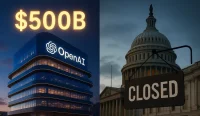In a dramatic escalation of his America First agenda, President Donald Trump has issued a stark H-1B visa warning to major technology companies, specifically targeting Microsoft and Google for their overseas hiring practices. During a high-profile AI Summit in Washington on July 23, 2025, Trump delivered a direct message to American tech giants, urging them to prioritize domestic job creation over international recruitment, particularly from countries like India.
The H-1B Visa Warning: Trump’s Direct Challenge to Tech Giants
The H-1B visa warning represents a significant shift in the administration’s approach to technology workforce development. President Trump’s comments at the AI Summit signal a potential crackdown on the H-1B visa program, which has long been a cornerstone of Silicon Valley’s global talent acquisition strategy.
H-1B visa warning from the White House comes at a critical juncture for the technology industry, as companies continue to face talent shortages while simultaneously navigating increasing political pressure to prioritize American workers. The timing of this announcement, during a major AI Summit, underscores the administration’s focus on ensuring that the benefits of technological advancement primarily accrue to American citizens.
Key Points from Trump’s H-1B Visa Warning
The President’s message contained several critical elements:
- Direct targeting of Microsoft and Google for their overseas hiring practices
- Emphasis on domestic job creation over international recruitment
- Specific mention of Indian tech workers as a focus area
- Connection to broader economic nationalism and America First policies
- Implications for future H-1B visa policy and enforcement
The AI Summit Context: Why This H-1B Visa Warning Matters
The H-1B visa warning was delivered during a significant AI Summit in Washington, a venue that highlights the administration’s concern about maintaining American technological leadership while ensuring domestic workforce participation.
Strategic Timing of the H-1B Visa Warning
The timing of this H-1B visa warning is particularly significant because:
- AI Industry Growth: The artificial intelligence sector is experiencing unprecedented growth
- Talent Competition: Tech companies are competing fiercely for skilled workers
- Political Climate: Election year politics are influencing policy priorities
- Economic Nationalism: Growing emphasis on domestic manufacturing and employment
Impact on Major Tech Companies
The H-1B visa warning directly affects companies that have historically relied on international talent:
- Microsoft: One of the largest H-1B visa sponsors in the technology sector
- Google: Significant user of international talent for AI and software development
- Other Tech Giants: Companies across Silicon Valley may face similar pressure
- Startup Ecosystem: Smaller companies may also be affected by policy changes
H-1B Visa Program: Current State and Future Implications
The H-1B visa warning raises questions about the future of a program that has been instrumental in building America’s technology workforce.
Understanding the H-1B Visa Program
The H-1B visa program allows U.S. companies to temporarily employ foreign workers in specialty occupations:
- Annual Cap: Currently limited to 85,000 visas per year
- Specialty Occupations: Requires specialized knowledge and bachelor’s degree
- Duration: Initial period of three years, renewable for up to six years
- Dependent Visas: H-4 visas for spouses and children
Historical Context of H-1B Visa Policy
The H-1B visa warning follows a pattern of policy changes under the Trump administration:
- Previous Restrictions: Earlier attempts to limit H-1B visa issuance
- Executive Orders: Various orders aimed at protecting American workers
- Regulatory Changes: Modifications to visa application processes
- Enforcement Actions: Increased scrutiny of visa compliance
Hiring?
Post jobs for free with WhatJobs — and connect with American technology professionals ready to drive your organization’s growth. Whether you’re seeking software developers, AI specialists, or IT experts, we deliver qualified domestic talent that understands today’s tech landscape.
Post a Job Now →Technology Industry Response to H-1B Visa Warning
The H-1B visa warning has generated significant reaction from the technology sector, with companies facing difficult decisions about their workforce strategies.
Immediate Industry Reactions
Technology companies are likely to respond to the H-1B visa warning in several ways:
- Increased Domestic Hiring: Accelerated recruitment of American workers
- Investment in Training: Enhanced programs to develop domestic talent
- Policy Advocacy: Lobbying efforts to maintain visa program flexibility
- Alternative Strategies: Exploring other ways to access global talent
Long-term Strategic Implications
The H-1B visa warning may lead to broader changes in how technology companies approach workforce development:
- Educational Partnerships: Closer collaboration with American universities
- Apprenticeship Programs: Investment in domestic skill development
- Remote Work Policies: Leveraging technology for global collaboration
- Diversity Initiatives: Enhanced focus on underrepresented American workers
Economic Impact of H-1B Visa Warning
The H-1B visa warning has significant economic implications for both the technology sector and the broader American economy.
Potential Benefits for American Workers
The H-1B visa warning could create opportunities for domestic workers:
- Increased Job Openings: More positions available to American citizens
- Higher Wages: Reduced competition from international workers
- Career Development: Enhanced training and advancement opportunities
- Job Security: Reduced risk of replacement by foreign workers
Challenges for Technology Companies
Companies may face several challenges in responding to the H-1B visa warning:
- Talent Shortages: Difficulty finding qualified American workers
- Increased Costs: Higher wages and training expenses
- Competitive Disadvantage: Potential loss of global talent advantage
- Innovation Impact: Possible slowdown in technological advancement
Policy Implications and Future Outlook
The H-1B visa warning suggests potential policy changes that could reshape the technology workforce landscape.
Potential Policy Changes
Based on the H-1B visa warning, several policy modifications may be forthcoming:
- Stricter Visa Requirements: More rigorous application and approval processes
- Increased Enforcement: Greater scrutiny of visa compliance and usage
- Domestic Hiring Mandates: Requirements for companies to prioritize American workers
- Training Requirements: Mandates for companies to invest in domestic workforce development
Political and Regulatory Environment
The H-1B visa warning reflects broader political trends:
- Economic Nationalism: Growing emphasis on domestic economic interests
- Worker Protection: Focus on protecting American employment opportunities
- Technology Leadership: Balancing innovation with domestic workforce development
- International Relations: Impact on relationships with key technology partners
Technology Workforce Development: Alternative Approaches
In response to the H-1B visa warning, companies and policymakers may explore alternative approaches to workforce development.
Domestic Talent Development
Companies may increase investment in developing American talent:
- Educational Partnerships: Collaboration with universities and technical schools
- Apprenticeship Programs: Structured training for technical skills
- Coding Bootcamps: Intensive training programs for software development
- Continuing Education: Support for ongoing skill development
Remote Work and Global Collaboration
Technology may enable new approaches to global talent utilization:
- Remote Work Policies: Leveraging technology for distributed teams
- Global Collaboration: International partnerships without visa requirements
- Knowledge Transfer: Sharing expertise across borders through technology
- Cultural Exchange: Virtual collaboration that respects domestic hiring priorities
Industry-Specific Implications of H-1B Visa Warning
Different sectors of the technology industry may be affected differently by the H-1B visa warning.
Software Development and AI
Companies in these areas may face particular challenges:
- Skill Shortages: High demand for specialized technical skills
- Innovation Pressure: Need for cutting-edge expertise in emerging technologies
- Global Competition: International companies may gain competitive advantages
- Research and Development: Potential impact on advanced technology development
Manufacturing and Hardware
Hardware-focused companies may experience different effects:
- Supply Chain Impact: Potential changes in manufacturing partnerships
- Engineering Talent: Challenges in finding specialized engineering skills
- Quality Control: Maintaining standards with domestic workforce
- Cost Considerations: Balancing quality with domestic labor costs
Educational and Training Implications
The H-1B visa warning may accelerate changes in how America develops its technology workforce.
University and College Response
Educational institutions may adapt to the new environment:
- Curriculum Updates: Enhanced focus on in-demand technical skills
- Industry Partnerships: Closer collaboration with technology companies
- Career Services: Improved job placement and career development support
- Continuing Education: Expanded programs for working professionals
Corporate Training Programs
Companies may expand their internal training capabilities:
- On-the-Job Training: Structured learning within the workplace
- Mentorship Programs: Experienced workers guiding new employees
- Skill Development: Continuous learning and upskilling initiatives
- Career Pathways: Clear advancement opportunities for domestic workers
Conclusion: Navigating the New H-1B Visa Landscape
The H-1B visa warning represents a significant shift in how America approaches technology workforce development. While the immediate impact may create challenges for companies accustomed to global talent pools, it also presents opportunities for developing a stronger domestic technology workforce.
Key Takeaways from the H-1B Visa Warning
- Policy Shift: Clear movement toward prioritizing American workers
- Industry Adaptation: Technology companies must adjust their hiring strategies
- Educational Investment: Increased focus on domestic talent development
- Competitive Balance: Balancing innovation with domestic workforce protection
- Long-term Planning: Need for strategic workforce development approaches
Looking Ahead
The H-1B visa warning suggests several trends to monitor:
- Policy Implementation: How the warning translates into specific policy changes
- Industry Response: How technology companies adapt their hiring practices
- Educational Evolution: Changes in how America develops technical talent
- Economic Impact: Broader effects on technology sector growth and innovation
- International Relations: Impact on America’s position in global technology leadership
As the technology industry navigates this new landscape, the H-1B visa warning serves as a reminder of the complex balance between global talent utilization and domestic workforce development. Success will require collaboration between government, industry, and educational institutions to ensure America maintains its technological leadership while providing opportunities for American workers.
FAQ Section
What is the H-1B visa warning and why is it important?
The H-1B visa warning is President Trump’s direct message to technology companies like Microsoft and Google to prioritize hiring American workers over international talent. It’s important because it signals potential policy changes that could significantly impact how technology companies recruit and develop their workforce.
How does the H-1B visa warning affect technology companies?
The H-1B visa warning affects technology companies by potentially limiting their access to international talent, requiring them to invest more in domestic workforce development, and potentially increasing hiring costs while facing talent shortages in specialized technical areas.
What are the key implications of the H-1B visa warning for American workers?
The H-1B visa warning could benefit American workers by creating more job opportunities, potentially increasing wages due to reduced competition, and encouraging companies to invest more in domestic training and development programs.
How might the H-1B visa warning impact the technology industry’s global competitiveness?
The H-1B visa warning could impact global competitiveness by potentially limiting access to international talent, while also encouraging greater investment in domestic workforce development and potentially strengthening America’s technology leadership through enhanced domestic capabilities.




